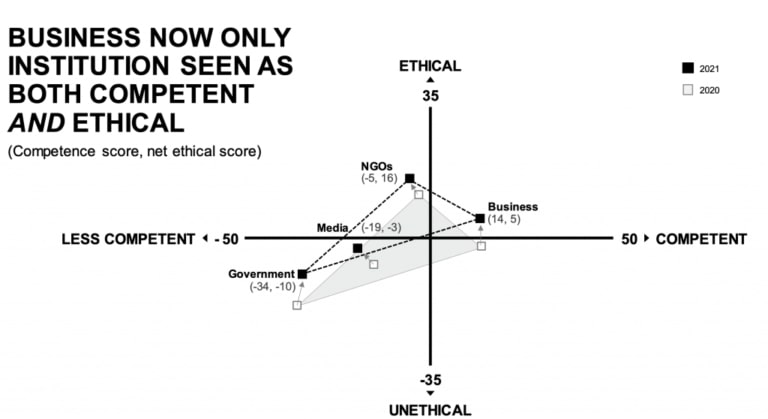
This article first appeared on radicalcompliance.com January 13, 2021
The Edelman Trust Barometer for 2021 just dropped today, and it continues to be a thought-provoking document for ethics and compliance professionals. The bottom line: people around the world distrust just about every institution except their own employer. So corporate compliance officers should turn that point to your advantage.
The Edelman report arrives every January, and it’s a massive survey (more than 30,000 people in dozens of countries around the world) to assess the public’s perceptions of trust in everything from government to media to business. That’s useful for compliance officers to know, since an understanding of how trusting people are can inform decisions your business makes about training, executive communications, policy development, internal controls, and more.
So what exactly did this year’s report say? In the largest possible frame, people around the world are slightly more trusting in institutions now than they were one year ago. The Edelman report ranks trust on a scale of 0 to 100, and overall trust for the global population rose from 54 in 2020 to 56 now.
At a more granular level, however, all sorts of more specific troubles emerge. For example, China dropped from a score of 82 to 72, the most significant decline among 25 major countries included in the report. In the United States, the overall trust score rose from 47 last year to 48 this year — but a score below 50 indicates a generally distrusting society. So we’re winning no prizes here.
Moreover, Edelman found what it described as a trust bubble. That is, around the world, trust rose in late spring, presumably as a frightened public sought guidance from their governments and businesses during the first wave of the pandemic. Then that bubble burst in the latter half of the year, presumably as we all grew accustomed to pandemic life and reverted to our more traditional habits of not liking each other. Figure 1, below, shows the trust bubble for the 11 largest countries included in the report.
Good News for Business and Trust
For several years now, the Edelman report has found that the single institution people trust most is their own employer. Globally, people’s trust in their own employer stood at 72. That’s down from a score of 76 last year, but still far higher than trust in government (53), non-governmental organizations (57), or the media (51). It’s also higher than the public’s trust in business overall, which was 61 — so beware that although employees might trust your business a lot, others don’t.
On the brighter side, the public now also sees businesses as both competent and ethical. That’s an improvement from last year, when people saw businesses as competent but not ethical. The Edelman report maps out those perceptions across two axes, and as you can see from Figure 2, below, businesses are the only institutions that the public believes are both competent and ethical.
We can only speculate about why people’s perception of business improved over the last 12 months, although presumably the pandemic had something to do with it. I suspect that as companies tried their best to accommodate people working from home, or to give more flexibility for childcare or sick leave, those gestures led to more appreciation that, yes, most businesses really do try to do the right thing most of the time.
The other major theme from the Edelman report is one we’ve seen for several years now: that employees expect their businesses, and specifically their CEOs, to take clear stands on business ethics issues such as social justice, climate change, and economic security (read: job losses due to automation). Another telling statistic: 65 percent of people believe that the CEO should hold themselves accountable to the public, not just to the board and shareholders.
As I mentioned, that’s been a running theme of the Edelman report for several years, and we can see reflections of that idea in Corporate America’s heightened attention to climate change, systemic racism, gender equity, and related issues. Old news.
What is new for 2021, where trust in one’s employer might emerge as a crucial factor, is the covid vaccine.
Line Up for Your Shot
Only 33 percent of people surveyed in the Edelman report said they would get a covid vaccination as soon as they could. Another 31 percent said they would get a vaccination within six to twelve months, to see how safe the vaccine actually is. That still leaves 36 percent of people unwilling to be vaccinated — a dangerously high number, since we need at least 70 percent of the population to be vaccinated if we want to achieve herd immunity and make covid recede once and for all.
This has implications for public health and corporate success alike, so businesses need to think long and hard about how they can encourage people to get vaccinated.
Communications from one’s employer are highly trusted: 61 percent of people said that they need to hear a message from their employer only once or twice to believe it’s true, a score better than messages from government, major corporations generally, the media, or advertising. Businesses need to put that credibility to work, issuing statements and policies about covid vaccination — namely, that government-approved vaccines are safe, and that people should get vaccinated as soon as the opportunity presents itself.
Perhaps this issue is a bit more relevant to HR teams than compliance teams, but not by much. If we let disinformation about vaccines infect the workforce, that’s going to be a drag on productivity. It will be a source of friction and complaints among employees, as they snipe about unsafe working conditions, retaliation (“My boss is telling me to get a procedure everyone knows is really about secret government mind control!”) or lord knows what else. Messy work environments like that tend to drag other management functions into the mess, compliance officers included.
Overall, the point here is that corporations do have the trust of their employees. That’s a precious resource, and one to be cultivated with care. So CEOs and other senior leaders must think about how to cultivate it — with clear, strong affirmations of ethical values, followed up by specific policies and actions that show the company takes those ethical values seriously. That’s how you keep trust preserved year after year, so it will be there when you need it.
And at least in the United States, as we try to shake off both a coup attempt and a pandemic far worse than it ever should have been, we need all the trust we can find.






